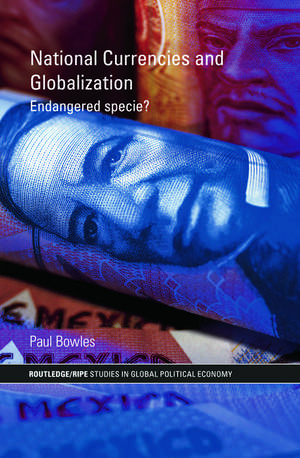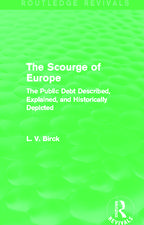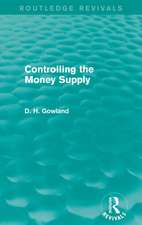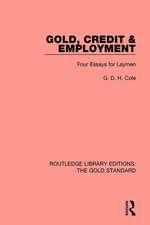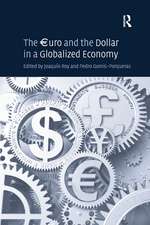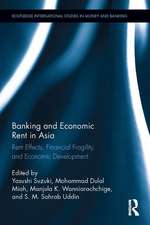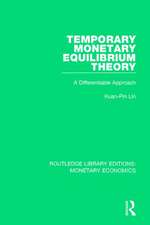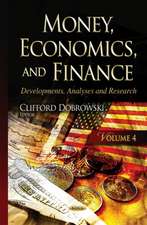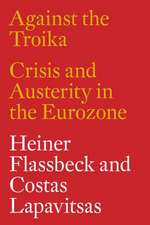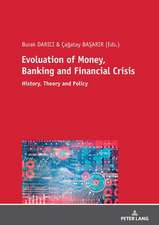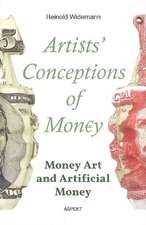National Currencies and Globalization: Endangered Specie?: RIPE Series in Global Political Economy
Autor Paul Bowlesen Limba Engleză Hardback – 20 dec 2007
However, inextricably linked they may be, but well understood they are not. In the case of national currencies, a wide variety of predictions and analyses can be found. For some, national currencies represent barriers to a seamless global economy. Others argue that national currencies will disappear due to the power of international financial markets which will force national governments to adopt more credible currencies and abandon their own. In contrast, others see imperialism or regionalism as the main challenges.
Paul Bowles provides an innovative and systematic analysis of the implications of theories of globalization for national currencies. He critically examines whether, as a result, the world is heading for fewer currencies. He argues that the main ‘force of globalization’ which is endangering national currencies is that of globalization as ‘neoliberal globalism’. However there is no single neoliberal position on money and so the ‘contingent’ nature of neoliberalism explains why this particular force of globalization operates more strongly in some countries than others. This is demonstrated in case studies of four systemically significant currencies, namely, those of Australia, Canada, Mexico and Norway.
National Currencies and Globalization will be of interest to researchers and students of International Political Economy, Politics, Economics and Finance.
| Toate formatele și edițiile | Preț | Express |
|---|---|---|
| Paperback (1) | 410.50 lei 6-8 săpt. | |
| Taylor & Francis – 2 feb 2011 | 410.50 lei 6-8 săpt. | |
| Hardback (1) | 1055.60 lei 6-8 săpt. | |
| Taylor & Francis – 20 dec 2007 | 1055.60 lei 6-8 săpt. |
Din seria RIPE Series in Global Political Economy
-
 Preț: 310.75 lei
Preț: 310.75 lei -
 Preț: 280.02 lei
Preț: 280.02 lei -
 Preț: 281.27 lei
Preț: 281.27 lei -
 Preț: 310.01 lei
Preț: 310.01 lei -
 Preț: 390.13 lei
Preț: 390.13 lei -
 Preț: 288.81 lei
Preț: 288.81 lei - 26%
 Preț: 820.21 lei
Preț: 820.21 lei - 18%
 Preț: 700.75 lei
Preț: 700.75 lei -
 Preț: 386.55 lei
Preț: 386.55 lei -
 Preț: 470.90 lei
Preț: 470.90 lei - 18%
 Preț: 999.82 lei
Preț: 999.82 lei - 18%
 Preț: 1054.97 lei
Preț: 1054.97 lei - 18%
 Preț: 1057.40 lei
Preț: 1057.40 lei - 18%
 Preț: 1053.16 lei
Preț: 1053.16 lei -
 Preț: 362.26 lei
Preț: 362.26 lei -
 Preț: 456.16 lei
Preț: 456.16 lei - 18%
 Preț: 1058.79 lei
Preț: 1058.79 lei - 18%
 Preț: 1057.89 lei
Preț: 1057.89 lei - 26%
 Preț: 822.54 lei
Preț: 822.54 lei -
 Preț: 278.75 lei
Preț: 278.75 lei - 18%
 Preț: 1056.47 lei
Preț: 1056.47 lei - 18%
 Preț: 1057.89 lei
Preț: 1057.89 lei - 18%
 Preț: 1054.89 lei
Preț: 1054.89 lei -
 Preț: 453.96 lei
Preț: 453.96 lei -
 Preț: 411.42 lei
Preț: 411.42 lei -
 Preț: 428.67 lei
Preț: 428.67 lei - 26%
 Preț: 821.53 lei
Preț: 821.53 lei -
 Preț: 487.86 lei
Preț: 487.86 lei -
 Preț: 353.94 lei
Preț: 353.94 lei - 26%
 Preț: 846.78 lei
Preț: 846.78 lei - 31%
 Preț: 766.24 lei
Preț: 766.24 lei - 18%
 Preț: 1058.43 lei
Preț: 1058.43 lei - 15%
 Preț: 425.07 lei
Preț: 425.07 lei - 18%
 Preț: 696.82 lei
Preț: 696.82 lei -
 Preț: 395.16 lei
Preț: 395.16 lei - 18%
 Preț: 700.31 lei
Preț: 700.31 lei - 18%
 Preț: 1004.20 lei
Preț: 1004.20 lei -
 Preț: 465.69 lei
Preț: 465.69 lei - 15%
 Preț: 672.40 lei
Preț: 672.40 lei - 18%
 Preț: 1016.52 lei
Preț: 1016.52 lei - 18%
 Preț: 1115.21 lei
Preț: 1115.21 lei -
 Preț: 485.07 lei
Preț: 485.07 lei
Preț: 1055.60 lei
Preț vechi: 1287.31 lei
-18% Nou
Puncte Express: 1583
Preț estimativ în valută:
202.02€ • 210.13$ • 166.77£
202.02€ • 210.13$ • 166.77£
Carte tipărită la comandă
Livrare economică 14-28 aprilie
Preluare comenzi: 021 569.72.76
Specificații
ISBN-13: 9780415774277
ISBN-10: 0415774276
Pagini: 224
Ilustrații: 9 b/w images, 13 tables and 9 line drawings
Dimensiuni: 156 x 234 mm
Greutate: 0.48 kg
Ediția:New.
Editura: Taylor & Francis
Colecția Routledge
Seria RIPE Series in Global Political Economy
Locul publicării:Oxford, United Kingdom
ISBN-10: 0415774276
Pagini: 224
Ilustrații: 9 b/w images, 13 tables and 9 line drawings
Dimensiuni: 156 x 234 mm
Greutate: 0.48 kg
Ediția:New.
Editura: Taylor & Francis
Colecția Routledge
Seria RIPE Series in Global Political Economy
Locul publicării:Oxford, United Kingdom
Public țintă
Postgraduate and UndergraduateCuprins
1. Introduction Part 1: Globalization and National Currencies 2. The Economic and Political Dynamics of Globalization: Four Interpretations 3. The Implications of the Four Interpretations of Globalization for National Currencies Part 2: Case Studies of Four Systemically Significant Currencies 4. Australia 5. Canada 6. Mexico (with Juan Carlos Moreno-Brid) 7. Norway (with Ådne Cappelen) Part 3: Conclusion 8. Comparative Conclusions: ‘Contingent Neoliberalism’ and the Limits of Globalism
Notă biografică
Paul Bowles is Professor of Economics and International Studies at the University of Northern British Columbia, Canada.
Recenzii
'In this very readable and clearly argued book, Bowles convincingly challenges the view that globalization necessarily threatens the ability of middle-sized states to maintain national currencies. He does so through a careful study of four countries - Canada, Norway, Australia and Mexico - which have each recently experienced a domestic debate about the future of their respective national currencies. None of these countries has chosen to abandon their national currencies, and none seems likely to do so soon. As Bowles shows, the cases highlight not just the enduring power of distinctive domestic politics in an age of globalization but also the contingent nature of neoliberalism. This book makes an important contribution to debates both about globalization and monetary politics, and it deserves a wide interdisciplinary audience.'
Eric Helleiner, CIGI Chair in International Governance, University of Waterloo, Canada
'In debates over the future of national currencies in an increasingly globalized world economy, most analysts look at either the top or the bottom of the international currency hierarchy. They either focus on rivalry among leading currencies like the US dollar and Euro, or else address the fate of the smallest and weakest currencies at the periphery of the monetary system. Paul Bowles makes and important and original contribution by concentrating on "systemically significant currencies" in the middle of the pack, where much of the monetary world is to be found. His admirably detailed research clearly demonstrates the considerable staying power of most national monies, contrary to predictions of their imminent demise. The book is must reading for any serious student of the political economy of international monetary relations.’
Benjamin Jerry Cohen, Louis G. Lancaster Professor of International Political Economy, University of California, USA
‘National Currencies and Globalization: Endangered Specie is the first book to assess whether four mid-sized currencies (those of Australia, Canada, Mexico and Norway) are at risk of becoming extinct. Paul Bowles provides a careful analysis of the domestic, regional and global circumstances that influence each four selected currencies, and concludes that for now they are here to stay. National Currencies is an excellent book; not to be missed by anyone who has an interest in globalization, regionalism and the future of national currencies.’
Amy Verdun, Jean Monnet Chair in European integration Studies, University of Victoria, Canada
Eric Helleiner, CIGI Chair in International Governance, University of Waterloo, Canada
'In debates over the future of national currencies in an increasingly globalized world economy, most analysts look at either the top or the bottom of the international currency hierarchy. They either focus on rivalry among leading currencies like the US dollar and Euro, or else address the fate of the smallest and weakest currencies at the periphery of the monetary system. Paul Bowles makes and important and original contribution by concentrating on "systemically significant currencies" in the middle of the pack, where much of the monetary world is to be found. His admirably detailed research clearly demonstrates the considerable staying power of most national monies, contrary to predictions of their imminent demise. The book is must reading for any serious student of the political economy of international monetary relations.’
Benjamin Jerry Cohen, Louis G. Lancaster Professor of International Political Economy, University of California, USA
‘National Currencies and Globalization: Endangered Specie is the first book to assess whether four mid-sized currencies (those of Australia, Canada, Mexico and Norway) are at risk of becoming extinct. Paul Bowles provides a careful analysis of the domestic, regional and global circumstances that influence each four selected currencies, and concludes that for now they are here to stay. National Currencies is an excellent book; not to be missed by anyone who has an interest in globalization, regionalism and the future of national currencies.’
Amy Verdun, Jean Monnet Chair in European integration Studies, University of Victoria, Canada
Descriere
This book provides an innovative and systematic analysis of the implications of the theories of globalization for national currencies; and critically examines whether, as a result, the world is heading for fewer currencies.
